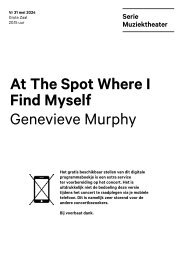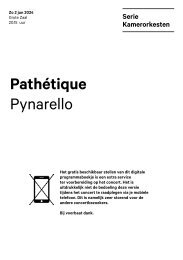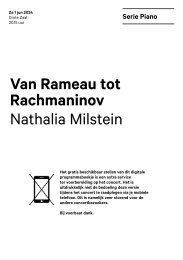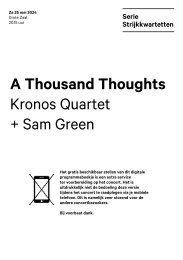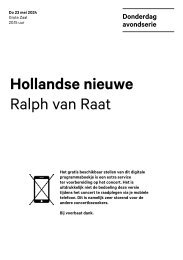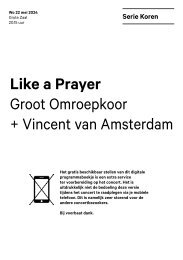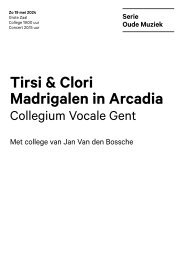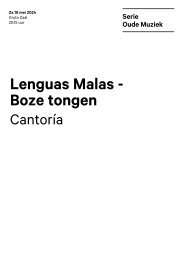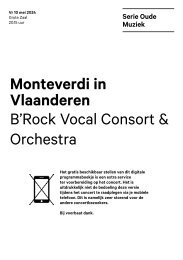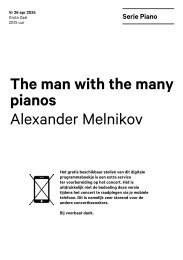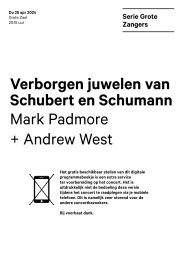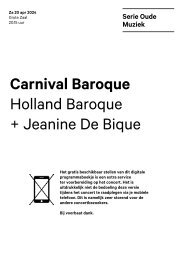You also want an ePaper? Increase the reach of your titles
YUMPU automatically turns print PDFs into web optimized ePapers that Google loves.
Programme notes<br />
Pyotr Tchaikovsky’s strong aversion to piano trios is well documented; in fact he couldn’t<br />
stand the idea of an ensemble comprising a string instrument and piano (as opposed to a<br />
piano in an accompanying role). On a number of occasions, he expressly refused to write<br />
a trio, yet it was precisely this formation that he chose for a memorial tribute to his very<br />
dear colleague and friend, Nikolai Rubinstein. It’s as if he wanted to augment his pain.<br />
On the day of Tchaikovsky’s death, some<br />
twelve years later, Rachmaninov began<br />
writing his D minor trio in Memory of the<br />
Great Artist. Rachmaninov, in his turn,<br />
was granted a memorial trio in 1943 by<br />
Alexander Goldenweiser – more celebrated<br />
as a music teacher than a composer – and<br />
a year later Shostakovich wrote his E<br />
minor trio in memory of his close friend<br />
Ivan Sollertinsky. The first in this mournful<br />
sequence, Tchaikovsky’s work is possibly<br />
the greatest and the most original. As often<br />
with Tchaikovsky, it is the amazing synergy<br />
of very unorthodox ideas and relatively<br />
simple, classical means that make the work<br />
soar. It exists as if in two different planes:<br />
the first movement in the earthly one, with<br />
its overwhelming waves of passion and<br />
suffering, ecstasy and despair; and the<br />
variations – in the heavenly plane, pure,<br />
enchanted, but increasingly alienating in its<br />
beauty as the work progresses. In some way,<br />
this shimmering and shining celestial world<br />
is not dissimilar to Mahler’s Das himmlische<br />
Leben of the 4th Symphony, even though<br />
Tchaikovsky’s solution for the ending of the<br />
piece is resolutely – one may say, typically! –<br />
non-Mahlerian.<br />
On the very border of the unknown<br />
The Ophelia songs are in line with the other<br />
settings of crumbling disintegrating psyche<br />
by Strauss, notably Salomé and Elektra. It is<br />
a curious collection; fragile and almost jewellike,<br />
at the same time they are fine studies<br />
exploring the limits of tonality (particularly<br />
in the second song), of the world familiar<br />
and organic to Strauss; they carefully tiptoe<br />
on the very border of the unknown. There<br />
is an unusual link between this set and the<br />
following song that occurred without us<br />
planning it. While Ophelia’s bitterness due<br />
to her lover’s broken promise (second in the<br />
set) begins with the words ‘Guten Morgen’,<br />
the song Morgen! itself, written over twenty<br />
years before, belongs to the set of songs<br />
composed by Strauss for his wife Pauline<br />
de Ahna as a wedding gift. One of Strauss’<br />
most beloved masterpieces it is a true<br />
miracle of great, elegiac beauty. It consists<br />
of paradoxes: brief and very economically<br />
written, it feels infinite and majestically vast;<br />
its euphoric greeting is set in the bittersweet<br />
tone of a farewell; and the qualities of<br />
musical language itself are peculiarly<br />
reminiscent of a late style – perhaps, most of<br />
all, of the language of the Four Last Songs.<br />
A realm of shadows<br />
We devised our festival program as an<br />
exploration of transience, the theme of<br />
transformation and transition from the<br />
familiar into the unknown. Alfred Schnittke, a<br />
somewhat Faustian figure in the XX century<br />
34






